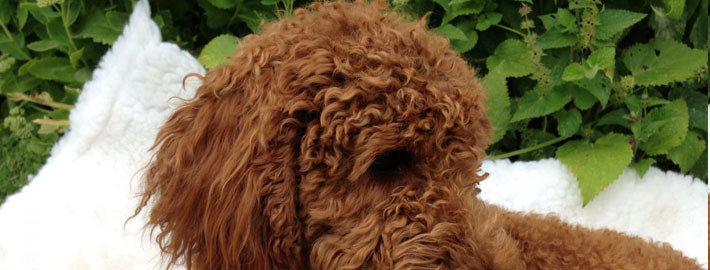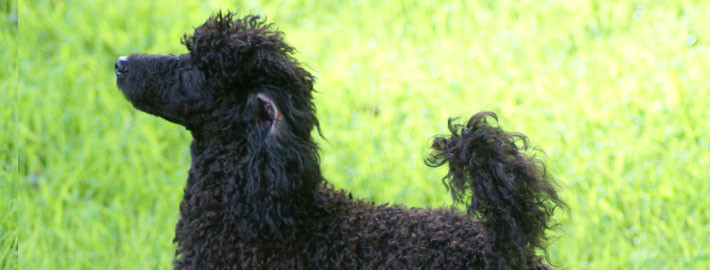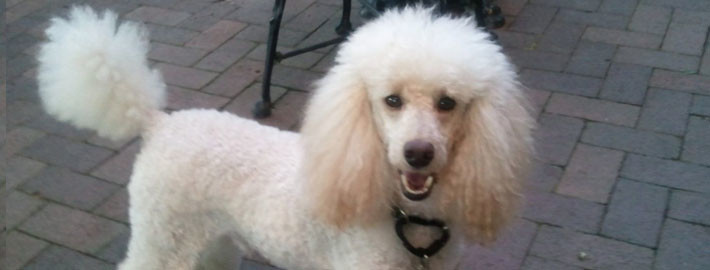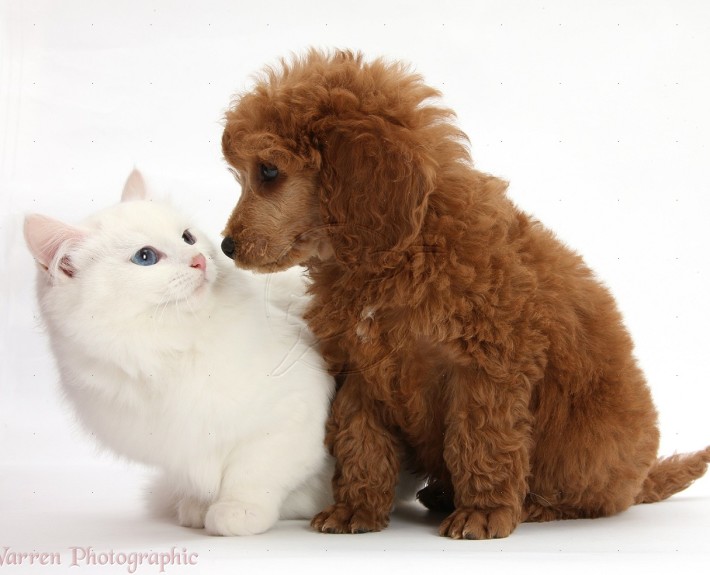What makes the Poodle (Miniature) Unique?
The poodle is a square-proportioned dog with proud carriage and elegant appearance. It should move with a light, springy, effortless stride. The poodle stems from working retriever stock, and its conformation should reflect its athletic background. The coat is curly, harsh and dense; if corded, it should hang in tight even cords.
No matter where the breed originated, Miniature Poodles have a long history that bespeaks their position as one of the most intelligent dog breeds in the world. Although they do require regular grooming, dog lovers that are willing to put forth the effort will be rewarded with a devoted companion for life.
Breed Groups
Page Contents
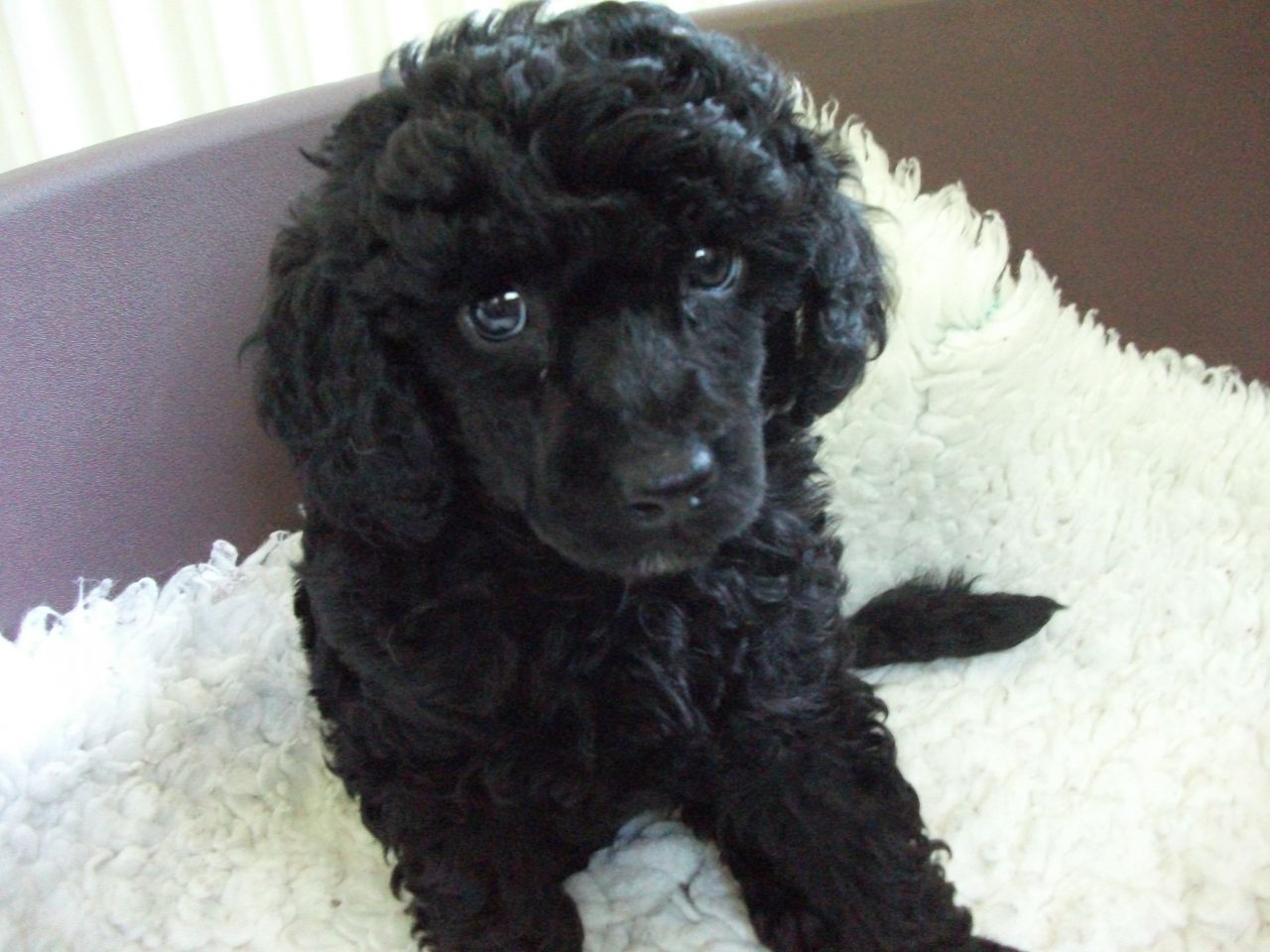
SnapShot
| Size: | Males – 11 – 15 inches (28-38 cm.) Females – 11 – 15 inches (28-38 cm.) |
| Weight: | Males – 15 – 17 pounds (7 – 8 kg.) Females – 15 – 17 pounds (7 – 8 kg.) |
| Origin: | Germany |
| Life Span: | 12 – 15 years, |
| Colour: | Cream, Silver, White, Apricot, R ed, Black, Brown,Blue, Gray, and Cafe au lait. |
| Litter Size: | 4 – 8 puppies, average 6 puppies |
Is the Poodle (Miniature) Right For You?
Miniature Poodles are one of the most popular dog varieties of all time. This fact is not surprising when one considers that members of this breed are known to be lively, people pleasing individuals. Miniature Poodles are also incredibly smart. These dogs often bestow most of their affection on one person, yet members of this breed typically get along well with other pets and older children.
Although some Miniature Poodles can be stubborn, housebreaking them is usually an easy task. These dogs learn quickly when rewarded with praise, treats, or toys for following their owner’s directions
In 5 Words
- Alert
- Instinctual
- Faithful
- Intelligent
- Active
Characteristics
Learn About the Poodle (Miniature)
Description
General Description
Poodles have square-shaped, athletic bodies. Wide-set, dark colored eyes are typical for this breed. They also have straight muzzles, rounded skulls, proportionate necks, and level backs. Their teeth should meet in a scissors bite. Members of this breed additionally possess drop ears that hang close to their heads. Poodles have straight front legs and angled hind legs that allow them to move about with an easy gait. In places where the practice is not illegal, show dogs may have their tails docked.
Size
Miniature Poodles of both genders typically stand about 10 to 15 inches (25 to 38 centimeters) tall. These dogs also have an average weight of 12 to 18 pounds (5.5 to 8 kilograms).
Coat
Miniature Poodles have thick, coarse coats. Their fur ranges from curly to tightly corded in texture. These dogs come in many different hues. Apricot, silver, white, cream, black, brown, and red are all acceptable colorations for Miniature Poodles. Several different styles are typically used on members of this breed, depending on their owner’s preference and the dog’s function. Adult dogs that are to be shown have a choice between the English saddle and the continental styles as well as the sporting cut for dogs that are being judged in non-regular classes. Younger members of this can obviously take advantage of the clearly named ‘puppy cut’.
Short History of the Poodle (Miniature)
Poodles have long been associated with France, but it is likely that the breed originated in Germany during the late Middle Ages. Ancestors of the modern Poodle are thought to have included the French Water Dog and the Barbet as well as some dogs of Asian extraction. Poodles traditionally functioned as retrievers that brought back downed waterfowl for their owners. These intelligent dogs were also capable of learning a wide variety of tricks and performed many practical jobs before they eventually joined the circus. Miniature and toy varieties were mostly likely bred down from the larger and slightly older Standard Poodle variant shortly after they made their debut. It is thought that some of these smaller dogs were originally used to hunt truffles. However, the three variations are typically judged together. In 1887, Poodles were officially admitted to the American Kennel Club.
Temperament
Miniature Poodles are one of the most popular dog varieties of all time. This fact is not surprising when one considers that members of this breed are known to be lively, people pleasing individuals. Miniature Poodles are also incredibly smart. These dogs often bestow most of their affection on one person, yet members of this breed typically get along well with other pets and older children. Due to their small stature and their tendency to snap when roughly handled, Miniature Poodles are not recommended for households with young children or toddlers. Although members of this breed are rather wary of strangers, they do not usually show aggressive tendencies. As a result, they make very good watchdogs. However, excessive barking can become an issue for members of this breed. This usually only happens when the dogs become lonely or bored so well-socialized, active dogs should have no problems in this regard.
Caring for Your Poodle (Miniature)
General Health
Miniature Poodles have an average lifespan of 14 or more years. However, members of this breed are particularly vulnerable to hormonal imbalances such as Addison’s and Cushing’s diseases. Progressive retinal atrophy, anemia, deafness, epilepsy, and various heart diseases may also strike individual dogs from time to time. Although they are not generally considered to be serious health concerns, allergies and premature greying have similarly been reported in some members of this breed. Owners should be aware that inadequate exercise or bad food can contribute to a number of ailments that Poodles face and plan their care accordingly.
Care
Daily
Miniature Poodles are incredibly energetic animals that need to be exercised every day. If they are not given appropriate amounts of exercise, these dogs may become destructive or anxious. Members of this breed will greatly enjoy spending their playtime with human beings or other, similarly sized dogs
Weekly
In order to promote good dental health, dogs should have their teeth cleaned with a vet approved toothpaste a few times per week, if not every day. Owners of Miniature Poodles will also need to comb their pet’s coat several times per week to keep tangles and mats from forming.
Monthly
Parasite prevention medication should be given to dogs to keep them healthy. Most of these products will need to be administered once per month in order to obtain adequate results.
Grooming & Bathing
Members of this breed do not shed as much as other dogs and widely are considered a better choice for allergy sufferers than most. Miniature Poodles will nonetheless need to have their fur trimmed about every six weeks or so. More extensive, professional grooming may be needed for show dogs. There are many different styles for owners to choose from, especially if they are not showing their pets. It is common for dogs to have their fur clipped short all over their bodies in what is known as a puppy cut. However, a modified version of this style is only acceptable for show dogs that are under a year old. Adult dogs that are being shown may instead be groomed in the English saddle or the continental styles. All Miniature Poodles will need to be bathed on a regular basis. These dogs should have their ears cleaned and their toenails clipped on a regular basis as well. Excess ear hair may also need to be trimmed.
Exercise & Training
Although some Miniature Poodles can be stubborn, housebreaking them is usually an easy task. These dogs learn quickly when rewarded with praise, treats, or toys for following their owner’s directions. Further training is likewise recommended for this breed because it will help provide the mental stimulation that they crave and prevent them from giving in to destructive impulses. After all, Miniature Poodles are intelligent dogs that are capable of learning many charming tricks and competing successfully in dog sports. So why not teach them some neat moves rather than letting them get so bored that they decide to eat the sofa?

